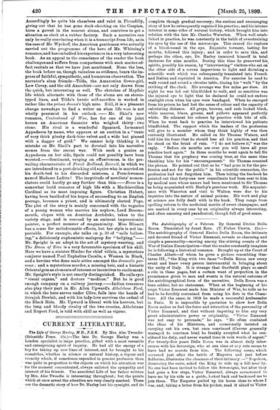CURRENT LITERATURE.
The Life of George Harley, M D., F.H.B. By Mrs. Alec Tweedie, (Scientific Press. 16s.)—The late Dr. George Harley was a London, specialist in large practice, gifted with a most versatile ' and enterprising spirit of inquiry. He had all the energy of a boy for taking up new lines of interest, and he brought to his reseakhes, whether in science or natural history, a vigour and vivacity which, if sometimes expended in greater profusion than. was quite in proportion to the objects on which his attention was • for the moment concentrated, always enlisted the sympathy and interest of his friends. The anecdotal .Life of her father written by Mrs. Alec Tweedie is interesting throughout ; but the points- which at once arrest the attention are very clearly marked.- These • are the dramatic story of how Dr. Harley lost his eyesight, and its complete -though gradual recovery.; the curious and-encouraging story of.how be subsequently regained.his.practicei and his intense interest in some sides of natural history, which brought him into relation with the late Mr. Charles Waterton. When well estab- lished in practice, he was constantly in the habit of overstraining his eyes by the use of the microscope. This caused the rupture of a blood-vessel in the eye. Exquisite torment, lasting for months, followed this injury; and in order to save this, and perhaps the other, eye, Dr. Harley immured himself in total darkness for nine months. During this time-he preserved his. spirits, possibly his reason, by "interviewing" visitors who sat on the other side of a screen impervious to light and dictating a scientific work which was subsequently translated into French and Italian and reprinted in America. For exercise he used to walk round and round a circular table, timing his " walk " by the striking of the clock. His average was five miles per diem. At night he was led out blindfolded to walk, and so sensitive was the injured eye to light that he declared he could not endure starlight even when his eyes were bandaged. When he emerged from his prison he had lost the sense of colour and the capacity of calculating distance. All greys, browns, and reds looked black, while mauves, blues, greens, and yellows appeared perfectly white. He relearnt his colours by practice with bits of silk. When he went back to practise he interviewed his patients blindfolded. The support which the leaders of the profession will give to a member whom they think highly of was then curiously illustrated. He called on Sir Thomas Watson, and told him his fears that he should lose all his practice, and that he stood on the brink of ruin. " I do not believe it," was the reply. " Before six months are over you will have all your practice back again." In three months he went again to tell Sir Thomas that his prophecy was coming true, at the same time thanking him for his " encouragement." Sir Thomas resented the phrase. He pointed out that as he " had gone in for the pro- fession and not for the public" in his scientific researches, the profession had not forgotten him. Then taking the fee-book he pointed out that forty-one new consultants had been sent to him by medical men whose names had been mentioned to Sir Thomas Ise being acquainted with Harley's previous work. His acquaint- ance with Waterton and visit to Walton were due to his inquiries into the nature of animal poisons. His work and play at science are fully dealt with in the book. They range from spelling reform to the medicinal merits of sweet champagne, and are marked in every case by an originality always interesting, and often amusing and paradoxical, though full of good sense.






































 Previous page
Previous page